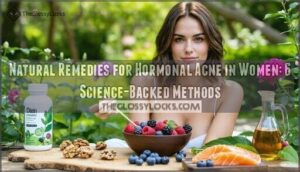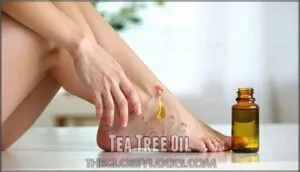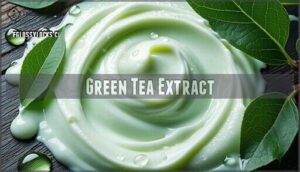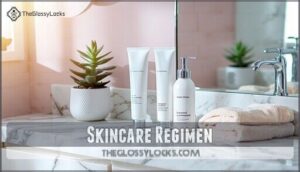This site is supported by our readers. We may earn a commission, at no cost to you, if you purchase through links.
 You can tackle hormonal acne with targeted natural remedies for hormonal acne in women that address root causes.
You can tackle hormonal acne with targeted natural remedies for hormonal acne in women that address root causes.
Start by cutting back on dairy and sugar – they’re notorious hormone disruptors.
Load up on omega-3 rich foods like salmon and walnuts to fight inflammation from within.
Consider DIM supplements to help your body process excess estrogen more efficiently.
Topically, tea tree oil acts as nature’s antiseptic, while green tea extract soothes angry skin.
Don’t underestimate stress management – chronic stress wreaks havoc on your hormones.
Regular exercise helps regulate hormone production naturally.
The secret lies in combining these approaches strategically for maximum impact.
Table Of Contents
- Key Takeaways
- Dietary Adjustments
- Hormone Balancing Supplements
- Natural Topical Treatments
- Lifestyle Changes
- Considerations for Exercise
- Consultation With Healthcare Professional
- Frequently Asked Questions (FAQs)
- How to treat hormonal acne naturally?
- Can a balanced diet help with hormonal acne?
- What foods are good for hormonal acne?
- What home remedies help with acne?
- Can hormonal acne be prevented?
- Which DERM-recommended ingredients are best for hormonal acne?
- How to stop hormonal acne in a woman?
- What to drink to clear up hormonal acne?
- How do I balance my hormones to get rid of acne?
- How do you detox hormonal acne?
- Conclusion
Key Takeaways
- Cut dairy and sugar from your diet – These hormone disruptors trigger insulin spikes and inflammation that fuel breakouts, so eliminating them can dramatically reduce acne flare-ups.
- Add targeted supplements like DIM and omega-3s – DIM helps your body process excess estrogen more efficiently, while omega-3 fatty acids fight inflammation from within to support clearer skin.
- Use natural topical treatments strategically – Tea tree oil acts as nature’s antiseptic against acne bacteria, and green tea extract soothes inflammation without harsh chemical side effects.
- Manage stress and exercise regularly – Chronic stress wreaks havoc on your hormones, so incorporating stress-reduction techniques and consistent physical activity helps regulate hormone production naturally.
Dietary Adjustments
What you eat directly influences your hormone levels and skin health. By making strategic dietary changes, you can reduce inflammation and balance the hormones that trigger acne breakouts.
Foods to Avoid
When managing hormonal acne through diet, certain foods can sabotage your skin’s healing journey.
These dietary culprits trigger insulin spikes and inflammation, creating the perfect storm for breakouts. Understanding the role of hormonal acne is essential for effective acne management.
Key foods to eliminate:
- High GI Foods and Refined Carbs: White bread, pasta, and sugary cereals cause blood sugar spikes that increase sebum production
- Dairy Products: Milk, cheese, and yogurt contain hormones that may stimulate oil glands and worsen inflammation
- Processed Meats and Sugary Foods: These promote insulin resistance and hormonal imbalances that fuel acne flare-ups
Foods to Incorporate
While certain foods trigger hormonal acne, others actively combat it through their anti-inflammatory properties.
Focus on incorporating these skin-healing nutrients into your daily routine for clearer, healthier skin.
| Food Category | Skin Benefits |
|---|---|
| Leafy Greens | Detoxify and reduce inflammation |
| Fresh Fruits | Provide antioxidant protection |
| Omega Rich foods | Balance hormones naturally |
| Probiotic Foods | Support gut-skin connection |
| Antioxidant Rich options | Fight free radical damage |
This holistic approach to nutrition supports women’s health by addressing hormonal acne from within.
These natural remedies work synergistically to restore balance and promote lasting skin clarity.
A well-planned anti aging diet can also help reduce the appearance of acne and promote overall skin health.
Hormone Balancing Supplements
When hormonal fluctuations trigger persistent breakouts, targeted supplements can help restore your body’s natural balance from within.
Strategic supplementation addresses the root hormonal imbalances that fuel acne formation, offering a science-backed approach to clearer skin.
DIM Supplements
DIM’s hormone-regulating power helps you reclaim control over stubborn hormonal acne. These cruciferous vegetable-derived supplements work by converting potent estrogen into gentler forms, potentially reducing sebum production that clogs your pores.
Take control of hormonal acne naturally—your skin deserves balance, not harsh chemicals.
Here’s how DIM benefits your skin:
- Estrogen Balance – Shifts harmful estrogen metabolites toward protective forms
- Hormone Regulation – Blocks aromatase enzyme that converts testosterone to estrogen
- Acne Reduction – May decrease inflammatory lesions by up to 30% after 12 weeks
- Supplement Dosage – Typical range is 100-200mg daily with meals
- Natural Acne Remedies – Provides gentler alternative to harsh pharmaceutical treatments
While research remains limited, many women report clearer skin after consistent use. Consult your healthcare provider before starting any hormonal acne treatment regimen. Understanding hormone metabolism is essential for effective acne management.
Vitamin and Mineral Supplements
Beyond DIM, targeted vitamin D and mineral balance support can transform your skin’s health.
Zinc supplements reduce inflammation and control oil production, while vitamin B5 calms stressed skin.
Antioxidant vitamins A and E tackle breakouts from within.
Omega 3 fatty acids fight inflammation, though omega 6-rich evening primrose oil also nourishes skin.
Probiotics support gut health, creating clearer skin through improved hormonal acne treatment using these natural acne remedies.
Maintaining adequate Vitamin D levels is essential for overall skin health and hormonal balance.
Natural Topical Treatments
When traditional cleansers aren’t cutting through stubborn hormonal breakouts, targeted topical treatments can provide the extra support your skin needs.
These natural remedies work directly on affected areas to reduce inflammation and combat acne-causing bacteria without harsh chemicals.
Tea Tree Oil
Tea tree oil offers powerful antibacterial and anti-inflammatory properties that target acne-causing bacteria while reducing skin inflammation.
This natural acne treatment helps minimize redness and swelling associated with hormonal breakouts.
Its antimicrobial capabilities make it an effective essential oil for acne relief.
Here’s how tea tree benefits your skin:
- Kills stubborn bacteria that fuel those painful cystic breakouts
- Calms angry inflammation that makes your skin look irritated
- Provides gentle skin soothing without harsh chemical side effects
Tea tree oil products are often found in tea tree oil solutions that can be used to treat acne.
Green Tea Extract
Why settle for just drinking green tea when you can harness its topical power against hormonal acne?
Green tea extract contains potent catechins—particularly EGCG—that deliver impressive antioxidant properties and inflammation reduction directly to your skin.
These compounds work as effective herbal remedies by targeting acne and hormones at the source, helping restore hormonal balance while providing targeted acne treatment.
You can apply cooled green tea as a toner or look for skincare products containing green tea extract.
The skin benefits include reduced sebum production and calmed irritation.
Unlike harsh chemicals, this gentle natural remedy won’t strip your skin’s protective barrier.
Research shows topical green tea extract substantially reduces acne lesions within 6-8 weeks of consistent use, making it a science-backed addition to your skincare arsenal.
For ideal results, consider purchasing high-quality green tea products to incorporate into your daily routine.
Lifestyle Changes
Beyond topical treatments and dietary changes, your daily habits play a vital role in managing hormonal acne naturally.
Simple adjustments to how you handle stress and care for your skin can substantially impact your hormone levels and, consequently, your complexion.
Stress Management
Chronic stress wreaks havoc on your hormones, spiking cortisol regulation and triggering breakouts.
Meditation benefits include reducing cortisol by 30%, while yoga practices improve hormonal balance.
Try breathing exercises and mindfulness techniques daily—even ten minutes helps.
These relaxation methods lower inflammation markers and support clearer skin through effective stress reduction.
Skincare Regimen
Managing stress sets the foundation, but your skincare routine becomes your daily defense against hormonal acne. Think of it as your skin’s security system—protecting against breakouts while supporting natural healing.
Your morning routine should start with gentle facial cleansing using a mild, pH-balanced cleanser. This removes overnight oil buildup without stripping your skin’s protective barrier. Follow with a non-comedogenic moisturizer to maintain hydration, then apply broad-spectrum sunscreen since acne-prone skin needs extra protection.
Evening routines focus on deeper care. Remove makeup thoroughly, cleanse again, and consider gentle skin exfoliation 2-3 times weekly using salicylic acid to unclog pores.
- Product ingredients matter: Choose hormone-friendly, natural skincare options free from harsh chemicals
- Consistency beats intensity: Gentle daily care trumps aggressive sporadic treatments
- Less is more: Simplified routines often yield better results than complex multi-step regimens
- Moisturizing tips: Even oily skin needs hydration—dehydrated skin produces more oil
- Natural remedies integration: Incorporate tea tree oil or green tea extracts for targeted treatment
Considerations for Exercise
Regular exercise helps regulate insulin sensitivity and reduces stress hormones that trigger acne flare-ups.
You’ll want to choose activities that promote circulation and hormone balance without causing excessive sweating that could clog pores.
Benefits of Regular Exercise
Regular physical activity serves as your hormonal harmony partner, naturally reducing cortisol levels that trigger breakouts.
Move your body, balance your hormones—exercise is nature’s acne fighter.
Exercise routines boost circulation, delivering oxygen and nutrients while flushing toxins from your skin.
Daily movement enhances insulin sensitivity, supporting hormonal balance essential for clear skin.
Whether it’s morning walks or structured workout plans, consistent fitness goals help regulate the hormones behind hormonal acne.
Regular exercise also promotes hair growth benefits that can have a positive impact on overall well-being.
Types of Exercise to Explore
Finding the right exercise routine can transform your skin health while boosting your overall well-being.
Different types of physical activity offer unique benefits for managing hormonal acne and achieving hormonal balance in women.
Yoga Exercises combine gentle movement with stress reduction, making them perfect for lowering cortisol levels.
The breathing techniques and mindful poses help regulate your nervous system while improving circulation to your skin.
Aerobic Workouts like brisk walking, swimming, or cycling enhance your body’s natural detoxification process.
These cardio routines increase blood flow, delivering oxygen and nutrients to skin cells while helping eliminate toxins through sweat.
Strength Training builds lean muscle mass, which improves insulin sensitivity—a key factor in hormonal acne management.
Resistance exercises also boost confidence and provide a healthy outlet for stress.
Pilates Moves focus on core strength and controlled breathing, offering similar benefits to yoga while building functional strength.
Here are three compelling reasons to start moving today:
- Your skin will thank you – Exercise literally glows from the inside out
- Stress melts away – Physical activity is nature’s anxiety medication
- Hormones find their rhythm – Regular movement helps your body’s natural cycles sync up
Consultation With Healthcare Professional
While exercise helps balance hormones, professional guidance becomes essential when natural methods aren’t enough.
A healthcare professional provides Medical Diagnosis and thorough Skin Analysis to identify underlying causes of your hormonal imbalance.
Your dermatologist will recommend Hormone Testing to pinpoint specific triggers and create personalized Treatment Plans.
Here’s what to expect:
| Assessment Type | Purpose |
|---|---|
| Medical History | Identify acne and hormones patterns |
| Physical Examination | Evaluate skin condition severity |
| Blood Work | Test hormone levels and markers |
| Lifestyle Review | Assess diet, stress, sleep factors |
| Treatment Matching | Develop targeted hormonal acne treatment |
Doctor Recommendations often combine prescription medications with natural approaches, ensuring you get extensive care that addresses root causes rather than just symptoms.
Effective skincare routines may involve anti aging skincare products to promote healthier skin.
Frequently Asked Questions (FAQs)
How to treat hormonal acne naturally?
You’ll tackle hormonal acne by balancing your diet with low-glycemic foods, managing stress through meditation, using tea tree oil topically, and taking vitamin D supplements while maintaining gentle skincare routines.
Can a balanced diet help with hormonal acne?
Your skin’s rebellion might be sending you a message about what’s happening inside.
A balanced diet can absolutely help with hormonal acne by stabilizing insulin levels, reducing inflammation, and supporting hormone regulation through nutrient-dense, low-glycemic foods.
What foods are good for hormonal acne?
You’ll want to focus on low-glycemic foods like whole grains, leafy greens, and lean proteins. These stabilize insulin levels, reducing androgen spikes that trigger breakouts and inflammation.
What home remedies help with acne?
You’ll find relief with tea tree oil (diluted with carrier oil), green tea face masks, aloe vera gel, and honey treatments.
These natural anti-inflammatory remedies reduce bacteria and soothe irritated skin effectively.
Can hormonal acne be prevented?
Sarah’s monthly breakouts around her jawline disappeared after she balanced her hormones through diet and stress management.
You can prevent hormonal acne by maintaining stable blood sugar, managing stress levels, and supporting your body’s natural hormone production through consistent lifestyle choices that help in managing stress levels.
Which DERM-recommended ingredients are best for hormonal acne?
Dermatologists recommend retinoids, salicylic acid, and benzoyl peroxide for hormonal acne. You’ll also benefit from niacinamide, which reduces inflammation, and azelaic acid for gentle exfoliation and antibacterial effects.
How to stop hormonal acne in a woman?
Think of hormonal acne as your body’s alarm system gone haywire. Balance hormones through low-glycemic foods, stress management, adequate sleep, and gentle skincare with tea tree oil or green tea.
What to drink to clear up hormonal acne?
Green tea, dandelion root tea, and anti-inflammatory smoothies with spinach help clear hormonal acne.
You’ll also benefit from drinking plenty of water daily to flush toxins and support your body’s natural detoxification processes, which is essential for overall health, and naturally helps your body to function properly.
How do I balance my hormones to get rid of acne?
Picture your hormones throwing an epic tantrum while your skin pays the price.
Balance them by managing stress, eating low-glycemic foods, getting adequate sleep, and incorporating anti-inflammatory nutrients like omega-3s and zinc supplements.
How do you detox hormonal acne?
Support your body’s natural detox pathways by drinking plenty of water, eating anti-inflammatory foods like leafy greens.
Managing stress through meditation, and using gentle skincare with natural ingredients like tea tree oil.
Conclusion
Think of your skin as a garden – the right natural remedies for hormonal acne in women work like careful tending, addressing root causes rather than just surface symptoms.
You’ve got powerful tools at your disposal: strategic dietary changes, targeted supplements, proven topical treatments, and lifestyle modifications that work together synergistically.
Remember, consistency beats perfection. Your hormones didn’t go haywire overnight, and they won’t balance immediately either.
Give these evidence-based approaches time to work their magic while maintaining patience with your body’s natural healing process.










